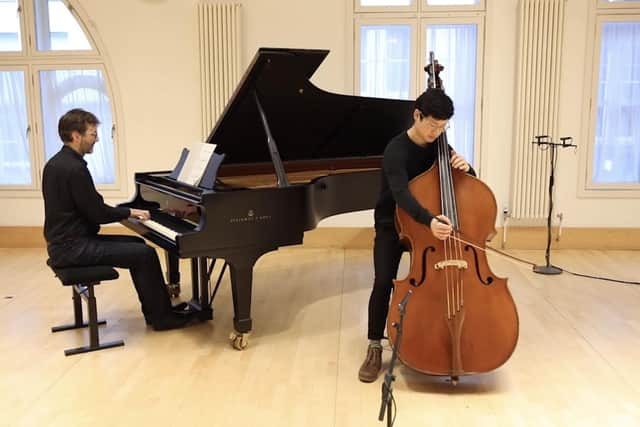The Scotsman Sessions #391: Gyunam Kim with Michael Bawtree
The general impression of the classical double bass can often be that musical history hasn’t demanded too much of it. Sure, it’s taller than most of the people who play it, and an entire orchestral section can resemble a daunting phalanx. But in terms of its functionality there’s a swathe of early symphonic repertoire that asks for little more than a poignant pizzicato “ping” or a mere felt underlay to the sexier cellos.
“It’s big; you can’t help but notice it,” agrees Gyunam Kim, the 25-year-old recently-appointed principal double bass of the BBC Scottish Symphony Orchestra, whose decision to take up the instrument, aged eight was a case of Hobson’s choice. His local South London music service offered either the bass or the tuba. “I fancied the tuba because it was all metal and looked cooler,” he recalls. “My mum insisted the double bass suited my personality, whatever that means.”
Advertisement
Hide AdAdvertisement
Hide AdIf Kim’s performance of Giovanni Botessini’s Elegy in C is anything to go by, his mother rightly foresaw an extraordinary talent with a natural feel for music’s expressive line and facility to articulate its poeticism, even at the instrument’s most unimaginable heights. In tandem with pianist Michael Bawtree, Kim’s rich interpretation reinforces his belief that solo bass music “deserves much greater exposure than it gets, especially in this country”.


It’s no accident he chose to play Botessini, the 19th century virtuoso composer and performer often referred to in his day as the “Paganini of the Double Bass”. “He was a phenomenon, playing sell-out solo recitals, sometimes two or three in a single day,” says Kim. “Plenty of bassists play his music today; back then only he could.”
Even in the soft-flowing Elegy, Kim recognises Botessini’s awesome musical challenges. “It’s a piece I’ve revisited periodically since learning it as a kid. Each time I see it differently, almost like a check on where I am, at that moment, as a musician. I’ll look at my previous markings and think ‘what a load of rubbish’.”
Kim’s life journey began in South Korea, where he was born into an extended musical family. When he was three, his parents moved him and his siblings to London where his aptitude for the bass led to a coveted place at the specialist Purcell School, then to further studies at the Royal Academy of Music. His final undergraduate year was interrupted by the Covid outbreak in 2020, but by then he had already paved the way for a future orchestral career.
“I’d started applying for jobs when I was 19 and had trials with the Philharmonia Orchestra and Royal Opera House while still a student,” he recalls. He was serving out an orchestral fellowship with English National Opera when the BBC SSO came calling last year with the tempting offer of section principal. “Why wouldn’t I jump at the chance? It’s the best section in the orchestra,” he says. “I might be biased, of course!”
And will Glasgow hold on to him? “It’s totally my thing,” he insists. “I love it here.”